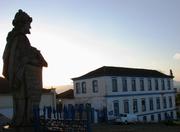Picture
More information on Sanctuary of Bom Jesus do Congonhas in Belo Horizonte

Description: Sanctuary of Bom Jesus do Congonhas in Belo Horizonte
Congonhas - 78Km from the capital Belo Horizonte, retains true artistic treasures and architectural gems. The most important is surely the Basilica of Bom Jesus do Matosinhos and its surroundings.
They are 78 life-sized sculptures, among them 12 prophets arranged in the churchyard and made of soap stone. The others, cedar form and represent the Steps of the Passion of Christ. The imagery is so monumental that was considered by the French Germain Bazin, the great scholar of the baroque, one of the most beautiful on earth. He went further: he believed to be "the last appearance of God evoked by the hand of man." And all this in the heart of Minas Gerais, thousands of miles away from major European centers trainers of Western society.
It all started in the second half of the century. XVIII at the initiative of one man dingy by ore dust and infused with faith. The Portuguese Feliciano Mendes, after recovering from an illness contracted in the many years of toil in the mines of gold, decided to build a temple in honor of Bom Jesus do Matosinhos, who had made a promise. He spent the rest of his life collecting alms and work began in 1757, dying in 1765 without seeing it completed.
Many artists were hired and joined their talents to finish the Basilica. Names such as Manuel da Costa Athayde, Francisco Xavier Carneiro, João Nepomuceno Ferreira and Antonio Francisco Lisboa (Aleijadinho) played with the dream of his art Feliciano. The church received finishing, paints and between 1777 and 1790 built the porch and its steps. This churchyard, from 1796, would be the perfect stage for the imagination of Aleijadinho. The prophets and stone steps have been adequate space in harmony and architectural design of the Sanctuary.
Between 1796 and 1805 Aleijadinho left what many consider his masterpiece. He was not alone. Had the help of his disciples. A precise study of the statues of the 66 Steps show variations that prove the intercession of third parties. Another important fact is that Aleijadinho at this time was severely crippled by a mysterious disease that researchers believed to be leprosy. Working with tools strapped to the arms. Recent studies in the artist's bones showed he suffered from porphyria. This disorder is characterized by sensitivity to light, which triggers a severe dermatitis and deforming. Mutilation becomes extensive, causing the loss of fingers, parts of the nose, ears and scars on the cheeks and mouth when exposed to light.
Interestingly, the painting of the statues of the Stations only began in 1808 with the implementation of the Master Athayde and probably also the Master Francis Xavier. Evidence to indicate that the painting of various groups of images was performed according to the chapels were built to house them. A question then arises: how the three chapels were only concluded in 1875, who had painted the statues that are in them?
In the book "Confidences of a Inconfidentes," the author says marilus Moreira Vasconcelos Aleijadinho miners was inspired by the conspiracy (see "Freedom even if late," in "Speaking of Mines") to compose the face of the 12 prophets in soapstone. The sad faces of the statues and the various symbols that they hide in their gestures and positioning, and the answer reveals the anguish of the artist before the tragic outcome of the Conspiracy. True or not this is one more ingredient to the fascination that awakens all the thousands of tourists each year visit the Basilica.
Basilica Time: Tuesday to Sunday, from 8 to 18 h. Free admission.
Tel: (0xx31) 3731-1591 or 3731-1590.
http://www.idasbrasil.com.br/idasbrasil/cidades/Congonhas/port/santuario.asp
More Photos of Picture








